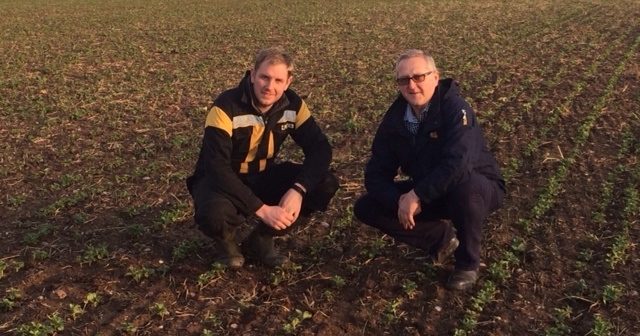Staffordshire based Rob Atkin, is one of the farmers who has signed up for the Frontier Agriculture protein premium bean opportunity.
Launched at the end of January, Frontier is offering an attractive price of £40/tonne* for beans above November wheat futures, with an additional £10/t premium for growers who opt for Frontier’s specialist bean agronomy package and achieve the required 29% protein targets.
This offer comes about with the construction of a new de-hulling plant near Nottingham due to open later this year, where beans will be processed to produce a protein-rich binding agent attractive to the fish farming industry.
For Rob Atkin, it is the perfect opportunity for him to exploit a new market for his bean crop.
“We have grown beans since 2010, and have alternated between springs and winters depending on the rotation. In 2017, with the ban on using PPPs on EFAs, we went back to winter beans as we could use the pre-ems we needed on those,”he says.
“However, with the opportunity to grow for Frontier’s processing plant which is fairly local, it made sense to opt back into spring beans.”
“As an alternative break crop, they have a valuable place in the rotation and if you get beans right, they can be a profitable crop as they don’t really require high inputs.”
Mr Atkin has chosen to grow the variety; LG Cartouche, as it offers the highest protein content available on the spring PGRO Recommended List 2019, sitting 1.3% ahead of any other pale hilum variety at 29.1%.
“To meet the 29% protein target needed by Frontier, it made sense to start at the highest genetic protein base level.”
LG Cartouche is also high yielding with very good standing ability and is early to mature, and as it is a pale hilum bean, it is also suitable for the premium human consumption market.
“Rob will be following our bespoke agronomy advice, using dedicated yield and protein boosting products to ensure the crop fulfils this potential,” explains Richard Plant, Frontier agronomist.
“Initial results from trials indicate that some of the new bio-stimulants have a positive effect on yield and protein. When used early in the growing crop, they have improved rooting and nutrient utilisation which helps in pushing for that extra quality.”
“LG Cartouche responds particularly well to this, with its higher base level protein content.”
Mr Plant points out that should the beans should reach human consumption quality there is still an option to trade them for the more lucrative human consumption market.
The beans were planned for an 8.5ha field of light loamy soil that was cover cropped over the winter; half with an EFA mix, and half with stubble turnips, and then it was finally grazed off with sheep.
“The whole farm has been min-till since 2003, and we will use one of two options for drilling; either run a Cultivator through first and then use an Amazon min-drill, or a Mzuri strip till-drill, which we are still trialling,” says Rob Atkin.
“I’ll aim to drill the crop at the beginning of March but if conditions are not right, I will hang back and wait for a week or 10 days. If the weather turns bad, March can be a long month and it doesn’t make too much difference if they have to be delayed until mid-March.”
“Getting the right establishment is key to a successful bean crop. If the crop starts well, then I would expect the spring crop to yield as well as a winter crop, and with the right nutrition through the Frontier programme, the quality should be there too to meet the spec for the extra premium.”
BOX Farm Facts
Field Farm
Field Uttoxeter
Staffordshire
397 ha arable cropping, to include; 2 wheats, oilseed rape, winter barley/oats and spring barley or beans. Maize has just come back into the rotation to improve soil health and fertility
80 ha grassland, with 230 beef cattle
Field Farm is a trial farm for South Staffs Water
* Contract premium correct as of 18th February 2019. Premiums can go up or down depending on market movement.




